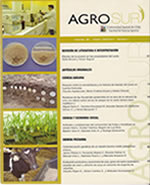Desarrollo histórico de la denominación Novillo de Osorno. Una revisión
Contenido principal del artículo
Resumen
El mercado de alimentos ha seguido una tendencia hacia la sofisticación de la oferta, lo cual está cambiando el enfoque para abordar la creación de valor en torno a la producción agropecuaria. El cómo y/o dónde se produce y/o el quién genera un producto pasan a ser aspectos relevantes, ya que otorgan un relato y sumergen al producto en una historia a contar a través de su consumo, especialmente en el marco de una visión territorial del desarrollo rural. El objetivo del presente trabajo fue revisar y explorar los elementos constitutivos de valor que pudieran estar ocultos constituyendo un relato (hasta el momento desaprovechado) de un producto tradicional de la ganadería del sur de Chile: el Novillo de Osorno. La revisión de antecedentes historiográficos permite concluir que este producto posee una historia singular que se asocia a un territorio claramente distinguible, en lo que hoy son las regiones de Los Ríos y Los Lagos, con un origen genético acotado, un modo de producción relativamente específico, criterios de calidad reconocibles y un nombre prestigioso con carácter identitario. Esto permitiría valorizar este alimento en base a su origen, en la medida que se especifiquen las relaciones de dicho valor con un protocolo con factibilidad productiva.

